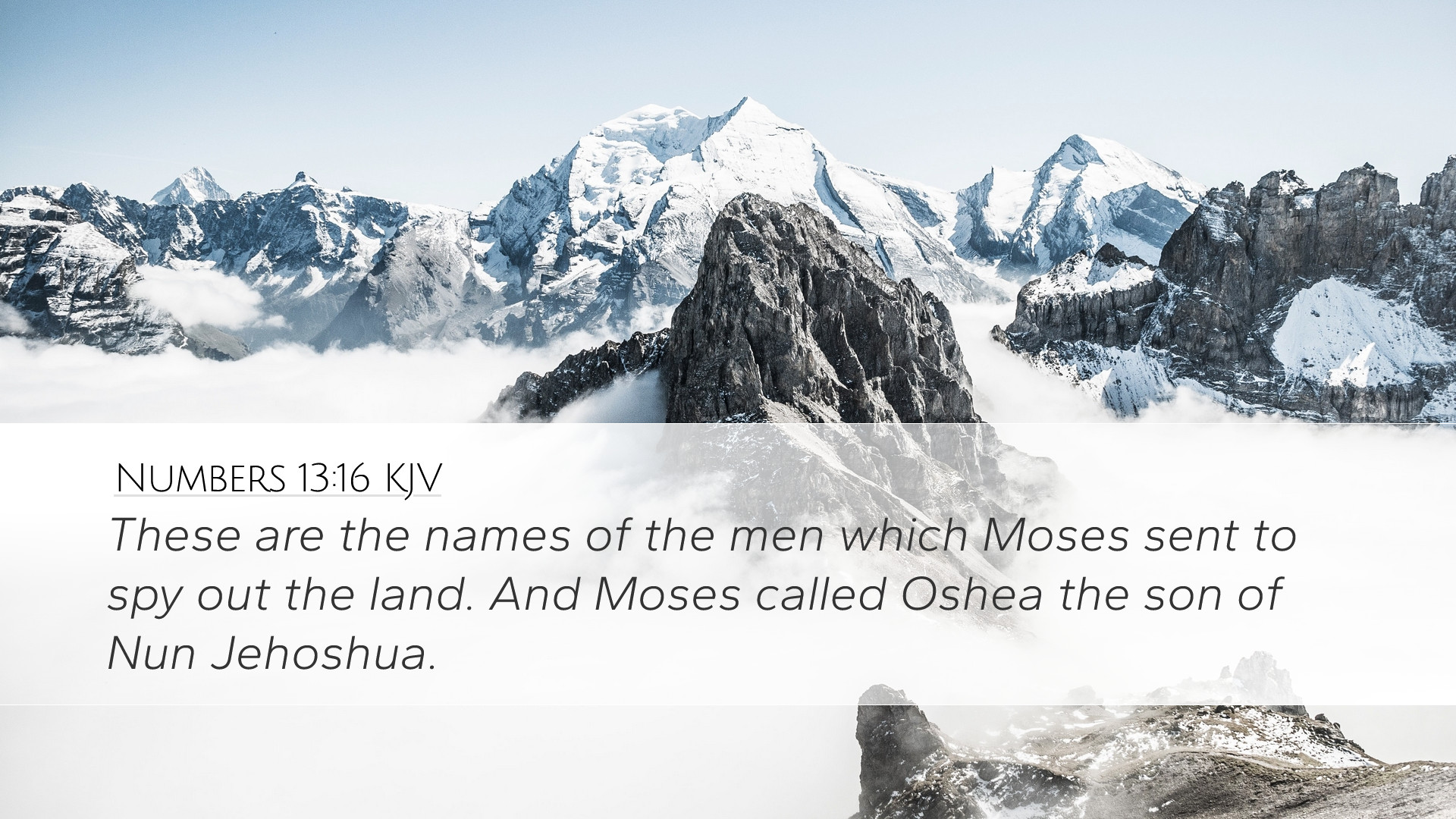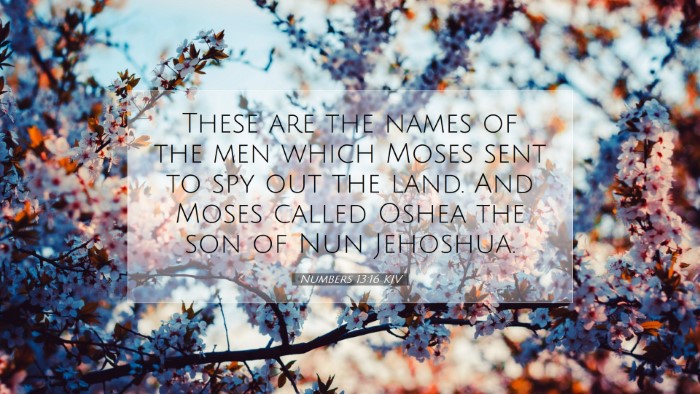Commentary on Numbers 13:16
Bible Verse: Numbers 13:16 - "These are the names of the men which Moses sent to spy out the land. And Moses called Oshea the son of Nun Jehoshua."
Introduction
In Numbers 13, we find a pivotal moment in Israel's journey through the wilderness, marking a transition from divine promise to the challenge of possessive faith. This commentary examines the significance of Numbers 13:16, focusing on the responsibilities bestowed upon the spies and the name change of Oshea to Jehoshua (Joshua).
Moses' Leadership and Its Significance
Moses' role in sending spies into the land of Canaan is a testament to his leadership qualities. According to Matthew Henry, Moses acted as a prudent leader, recognizing the need to gather intelligence on the land that God promised to Israel. This decision reflects both trust in God and a strategic approach to their conquest.
Albert Barnes emphasizes that by sending scouts, Moses demonstrates a wise balance between faith and preparation. It is through this act that the Israelites could ascertain not just the geographic makeup of Canaan, but also its inhabitants, thus preparing their hearts for the challenges ahead.
The Naming of Joshua
The renaming of Oshea to Jehoshua is of profound theological implication. Adam Clarke points out that names in Scripture often bear prophetic significance. Jehoshua, meaning "the Lord is salvation," reinforces the idea that true victory in battle comes through reliance on God’s power, not merely human strength or strategy.
This renaming is also a foreshadowing of Joshua’s future leadership role among the Israelites. By transforming his name, Moses not only sets a tone of divine reliance but also suggests a destiny of leadership and salvation that Joshua will personify.
The Central Role of Faith
The act of sending spies, while prudent, also raises questions about faith among the Israelites. Matthew Henry asserts that this mission revealed the skepticism that lay within the hearts of the people. The necessity of the spies can be interpreted as an indication of their wavering trust in God’s promise.
Albert Barnes notes that despite sending the spies to explore the land, God had already assured them of His promise to deliver the land into their hands. This paradox highlights the tension between human anxieties and divine assurance, ending in a crucial lesson about faith in God’s word.
The Outcome and Its Reflection on Leadership
The report of the spies and their subsequent reactions would shape the nation’s future. Adam Clarke notes that the varied responses of the ten spies versus the two (Joshua and Caleb) provide a critical lesson about courage and faith in God's promises.
The lack of faith shown by the majority of the spies can be a reflection on the consequences of poor leadership and the importance of maintaining a faithful perspective even amidst daunting challenges. Albert Barnes emphasizes that a leader must instill faith and courage in their followers, and failure to do so can lead to calamities.
Lessons for Modern Pastoral Leadership
For contemporary pastors and leaders within the Church, Numbers 13:16 serves as a rich text for reflection.
- Preparation vs. Faith: Leaders must find a balance between preparation and faith in God’s promises. Understanding the landscape—both spiritually and physically—while remaining firmly anchored in faith is essential.
- The Power of Names: Just as names signified destiny in the Bible, pastoral leaders ought to impart a sense of purpose and identity within their communities, recognizing that their words can shape individuals' understanding of divine calling.
- Encouragement in the Face of Trials: The example of Joshua encourages leaders to promote a spirit of courage in their congregations, especially when faced with opposition or doubt.
Conclusion
Ultimately, Numbers 13:16 is not merely an historical account; it is a rich tapestry interwoven with lessons on leadership, the critical nature of faith, and the significance of identity in Christ. For modern believers, understanding the context and the divine undertones of this passage can inspire a deeper faith and commitment as we navigate our own "promised lands." In following God's command, may we also strive to embody the spirit of Jehoshua, trusting in divine salvation amid every challenge.


